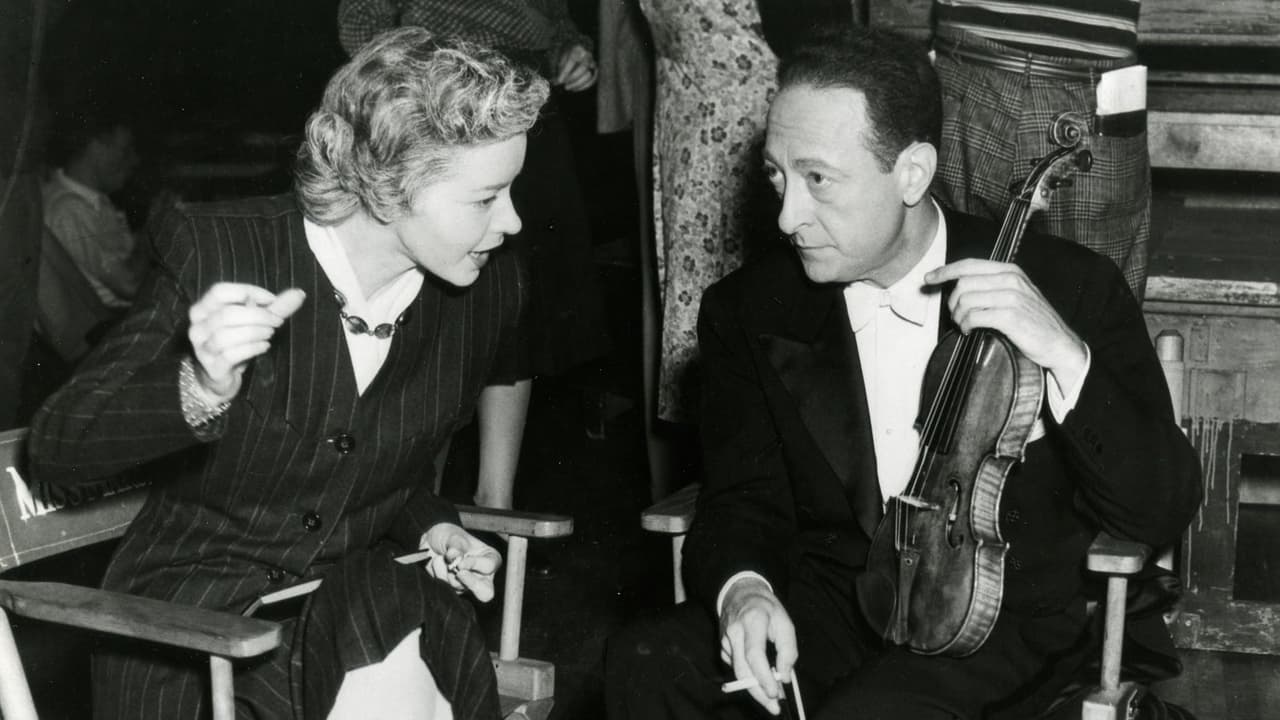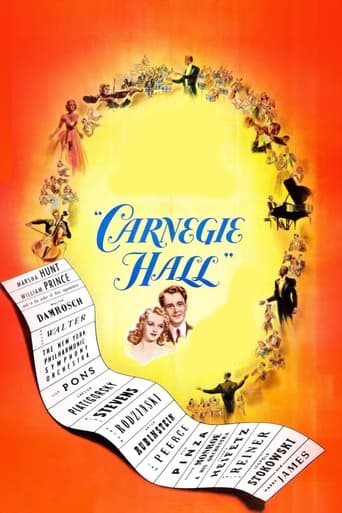

Really Surprised!
... View MoreInstead, you get a movie that's enjoyable enough, but leaves you feeling like it could have been much, much more.
... View MoreWatch something else. There are very few redeeming qualities to this film.
... View MoreWhile it doesn't offer any answers, it both thrills and makes you think.
... View MoreTaken from an idea by Silent Screen Star Seena Owen low budget director Edgar G. Ulmar pays homage to classical music and captures the performances of many of the greatest living soloist and conductors of the 1940's. The plot is simple and somewhat sweet. Cute little Irish immigrant moves to the New York during the opening of the great hall. By coincident her aunt works there and she is allowed to watch the performance. Struck by it's beauty, she develops a life-long obsession with Carnegie Hall; where she eventually begins work as a cleaning woman. She marries a pianist, and during the weakest part of the script they shoot from many years of bliss to a marriage ending fight when he decides to quit the Hall. Conveniently, he falls down the stairs drunk and dies. While their son is growing up mom continues to guide his life toward The Hall. Studying, practicing finally becomes a burden for him and in his late teens or early twenties meets a young singer and he runs off with her and joins a dance band. Time goes by and our mom has become old, she has risen through the ranks of Carnegie Hall and has become rich, but she does not have her son. She realizes that she has made mistakes and when the young wife of her son asks for her help she rushes to make everything alright...of course we end up back at The Hall for a happy ending. All this is merely decoration for the directors true purpose, the music and the artists. I had the chance to meet Marsha Hunt many years ago when I was a young man in L.A. She was a very pleasant women and still attractive, but I never had any idea how beautiful she was as a young woman. She is stunning and her talent is no less so. I am not amazed that such a talent is lost in early Hollywood. I have heard so many stories about similar destruction of great talent, by less talented studio heads of the time. They had no idea what to do with intelligent and talented women. It was all of our loss, however, that Ms. Hunt was not able to command a career that would have been fitting. In this movie, she alone carries the story. As ridiculous as the script is, and the ton of plot holes she makes the film watchable when the musicians are not on screen.
... View MoreLong before Carnegie Hall came to the big screen, modern swing music arrived there with Benny Goodman and his clarinet with that famous concert in the late Thirties. So the idea behind the film was already quite dated.But the rather hokey plot of this film only serves as a frame for numbers by more classical artists than ever gathered on one movie at the same time. If you love classical music and the great artists who are no longer with us from the past than this is your movie and no review good or bad will have anything to do with whether you see it or not.Such as it is the story revolves around Marsha Hunt whose mother was a charwoman at Carnegie Hall and she started there as well and worked her way up to part of the management. She married and had a son who grew up to be William Prince who listening to the greatest classical artists around got a real musical education. But all Prince wants to do is play piano with Vaughn Monroe.Without giving too much away, let's say that the education was not in vain after all.With people like Walter Damrosch and Leopold Stakowski conducting symphonies and such artists as Lily Pons, Rise Stevens, Jan Peerce and my favorite Ezio Pinza on the screen, if you're a classical music fan this movie is a must for you. The story is easy to take as well and there's a nice performance by Frank McHugh as Carnegie Hall's eternal doorman.
... View MoreWARNING: Do NOT show this film to anyone in whom you're trying to stimulate an interest in classical music. That's what audio recordings are for.CARNEGIE HALL is an interesting relic that allows us a few glimpses of some great musicians in action, performing their signature works. If you already enjoy the music and want to see what Heifetz, Rubinstein, Piatigorsky, Peerce, Pinza, Stevens et al. looked like in their heyday (as well as some lesser-known but significant talents such as John Corigliano, Leonard Rose and Nadia Reisenberg), you can probably bear to sit through this film.But Lord!, the non-musical scenes (and even the mediocre "57th Street Rhapsody" that closes the film) are just dreadful. Marsha Hunt was an able journeywoman actress and does as credible a job as can be expected, but she has little to work with in the way of story and dialog. The other actors (as opposed to musicians playing themselves or other musicians) range from adequate to awful. All the clichés about artistic temperaments and a child straying from the career path chosen by the parent are on display, and they were stale long before CARNEGIE HALL was made. The efforts to "humanize" Heifetz, Reiner and Rubinstein also are trite (not that they shouldn't be portrayed as actual human beings, as opposed to Hollywood stereotypes of classical demigods. Heifetz was more fun a few years earlier in THEY SHALL HAVE MUSIC.) Other than the documentary aspect of CARNEGIE HALL's musical segments, I can see no reason to see this film more than once. And unless you really care about classical music and the people who make it, even a single viewing is excessive.Idle question: Can anyone explain why -- in the scene in which the kindly Nora arranges for the young performer "Mary" to use the hall for her debut -- that Mary is shot from the rear, and we never see her face? Rather strange.
... View MoreAlthough the music segments are second to none (Rubenstein, Heifetz, Pinza, Lily Pons, Rise Stevens, and representing the more 'modern' era Harry James and the great Vaughn Monroe) the story, what little there is, is really dreadful. Nora is a selfish and pathetic person in whom we have little or no interest, her piano-playing son has the personality of a goldfish, and the film is the clunkier for them both. Tip - if you see this on video fast-forward to the musical bits. They are well worth it and amazingly, all still look great after 53 years!
... View More